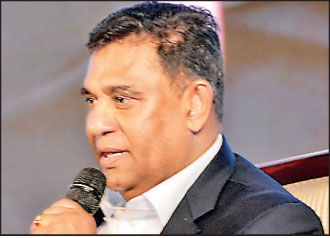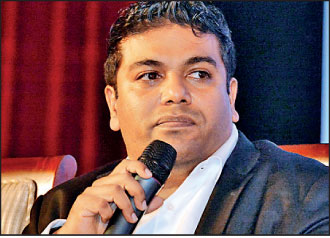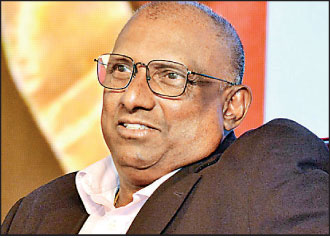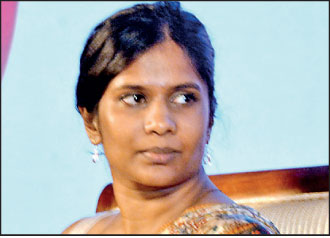Friday Feb 20, 2026
Friday Feb 20, 2026
Tuesday, 6 August 2024 00:32 - - {{hitsCtrl.values.hits}}

 Addressing brain drain and economic stability in Sri Lanka requires attracting global companies and leveraging the skills of expatriates. Expatriates, while contributing to brain drain, hold the key to reversing this trend by bringing in capital, expertise, and international companies. To build a sustainable economy, we must create a stable environment with supportive legal and structural changes that facilitate the return of skilled professionals and bolster the startup ecosystem
Addressing brain drain and economic stability in Sri Lanka requires attracting global companies and leveraging the skills of expatriates. Expatriates, while contributing to brain drain, hold the key to reversing this trend by bringing in capital, expertise, and international companies. To build a sustainable economy, we must create a stable environment with supportive legal and structural changes that facilitate the return of skilled professionals and bolster the startup ecosystem
– Australia Gateway Chairman and Principal Lawyer, Barrister and Solicitor Don Susantha Katugampala

 Sri Lanka stands at a pivotal moment, with the opportunity to position itself as a leading start-up-friendly nation. This represents perhaps the most significant chance for the country to address its challenges and harness local talent for global impact. Entrepreneurs have the potential to reverse brain drain and drive economic progress by transforming local problems into innovative solutions. Our AI capabilities need enhancement, with a focus on strong infrastructure and expanded access to data. However, the growing talent pool and successful local AI applications signal substantial potential for future growth
Sri Lanka stands at a pivotal moment, with the opportunity to position itself as a leading start-up-friendly nation. This represents perhaps the most significant chance for the country to address its challenges and harness local talent for global impact. Entrepreneurs have the potential to reverse brain drain and drive economic progress by transforming local problems into innovative solutions. Our AI capabilities need enhancement, with a focus on strong infrastructure and expanded access to data. However, the growing talent pool and successful local AI applications signal substantial potential for future growth
– SpectrifyAI Co-founder, Veracity AI Founder/MD, Digital Realty Managing Director, Orion City Founder/Chief Executive Officer, and Hatch Works Co-Founder Jeevan Gnanam

 Sri Lanka has the potential to tap into global opportunities in sports, particularly through technology. Viewing Sri Lanka as a resourceful player in the global market, rather than just a local market, is crucial. Building investor confidence through long-term, sustainable models is essential for the growth of Sri Lanka’s sports sector
Sri Lanka has the potential to tap into global opportunities in sports, particularly through technology. Viewing Sri Lanka as a resourceful player in the global market, rather than just a local market, is crucial. Building investor confidence through long-term, sustainable models is essential for the growth of Sri Lanka’s sports sector
– Former Sri Lankan Cricketer and Captain, and Ideal Holdings Deputy Chairman Aravinda De Silva

 The 2022 crisis severely impacted the construction industry, with issues like material price volatility, project delays, and brain drain. The industry’s resistance to change, coupled with high barriers to entry and regulatory hurdles, stifles innovation. Embracing new technologies like 3D printing and creating innovation labs within universities can bridge the gap between engineering and entrepreneurship. A shift towards innovation and capital investment is necessary to address the challenges and drive growth in the construction sector
The 2022 crisis severely impacted the construction industry, with issues like material price volatility, project delays, and brain drain. The industry’s resistance to change, coupled with high barriers to entry and regulatory hurdles, stifles innovation. Embracing new technologies like 3D printing and creating innovation labs within universities can bridge the gap between engineering and entrepreneurship. A shift towards innovation and capital investment is necessary to address the challenges and drive growth in the construction sector
– Tudawe Brothers Chief Executive Officer Romali Tudawe
By Michelle Therese Alles
|
– Invest India former MD and CEO Deepak Bagla –
|
|
– Yung Drung Export Hub Founder, tech consultant,
|
|
– ISSO Restaurants Chief Executive Officer/Founder Apinash Sivagumaaran |
|
– Commonwealth Enterprise & Investment Council Sri Lanka and The Maldives Chair Niro Cooke
|
|
– zMessenger Co-Founder and Chief Executive Officer Jayomi Lokuliyana
|
|
– Ministry of Crab Restaurant Co-Founder
|
With a focus on navigating the complexities of launching and scaling new ventures, the Start-ups Pillar of the Human Capital Summit 2024 offered invaluable insights into the strategies, challenges, and opportunities of the entrepreneurial landscape.
This pillar, headlined by influential figures such as Invest India former Managing Director and CEO Deepak Bagla, and Art Dane Finch, a notable South African-American entrepreneur and investor, tech consultant, and Founder of the Yung Drung Export Hub, highlighted the critical elements of successful startups, from securing funding and supporting innovation to building resilient teams and creating impactful customer experiences.
In his impactful keynote address, Deepak Bagla highlighted the pivotal role of human capital in shaping the future of global business. “Last year, the World Economic Forum identified access to trained manpower as a greater risk than even nuclear incidents,” he remarked, demonstrating the growing importance of skilled human resources. He noted that for the first time in corporate history, many CEOs are emerging from HR backgrounds, reflecting a shift in how companies value workforce management. This trend is particularly relevant for Asia, which is expected to supply over 40% of the world’s skilled workforce in the next 25 years, with India and Sri Lanka contributing more than 21% of this talent pool.
Bagla also emphasised the need for a shift from traditional education to preparing for an uncertain future. “In a world where everything is possible and nothing is certain, we need skills that teach us to be nimble and adaptable,” he said. He praised the region’s resilience and innovative spirit, citing India’s rapid economic growth as a testament to the power of digitisation and inclusive leadership. Highlighting the necessity of unity and collective action in navigating the evolving landscape of global business, he concluded, “Together is no longer a choice but an imperative.”
Transformative potential of startup zones
The next keynote speaker, Dane Finch, emphasised the transformative potential of startup zones in supporting innovation. He introduced the Gelephu Mindfulness City project in Bhutan, a groundbreaking initiative designed to facilitate cutting-edge technologies such as flying cars from its inception. “Silicon Valley’s success was significantly influenced by lax privacy laws and a favourable regulatory environment,” Finch explained, drawing parallels to the need for similar supportive frameworks in emerging markets. He highlighted the crucial role of tailored legal and infrastructural support in unlocking entrepreneurial potential, stating, “Zones where the law is focused on enabling startups are often the missing piece.”
Finch also addressed the need for agility in governance to keep pace with rapid technological advancements, particularly in deep tech and AI. “Sri Lanka must position itself to leverage these opportunities by designating zones as startup spaces,” he advised. He emphasised that the creation of such zones could catalyse human capital growth through upskilling and tech transfer, citing Dubai’s success in attracting international talent as a model. “The ratio of internationals to locals in Dubai is 10 to 1, which highlights their commitment to being a global talent hub,” he noted. He urged Sri Lanka to adopt a similar approach to enhance its startup ecosystem and drive sustainable development.
In response to a query about overcoming funding challenges in early-stage startup ecosystems, Mr Finch discussed its complexities, emphasising the need to address both cultural and regulatory layers to overcome funding challenges. He noted that regions like Silicon Valley benefit from a long history and favourable regulations, which contribute to their success. In contrast, Sri Lanka could benefit from a more founder-friendly approach by offering larger equity shares to startup founders, a practice that could attract VCs (venture capitalists) at the seed and pre-seed stages. Additionally, establishing start-up-focused zones with conducive regulatory systems could help in creating environments similar to those in places like Delaware, thus making Sri Lanka more attractive to international investors and VCs.
Addressing a question on the Colombo Port City economic zone, Finch praised the project for its potential to enhance Sri Lanka’s startup ecosystem. He highlighted that the Port City’s autonomy and competitive regulatory environment are crucial for its success. According to Finch, the Colombo Port City Economic Commission’s ability to make nimble decisions is vital for fostering a favourable environment for startups and VCs. Although the project is part of a long-term master plan, its international focus and regulatory advantages provide a solid foundation for attracting venture capital and supporting the growth of startups within the zone.
SpectrifyAI Co-founder, Veracity AI Founder/MD, Digital Realty Managing Director, Orion City Founder/Chief Executive Officer, and Hatch Works Co-Founder Jeevan Gnanam, serving as Pillar Head/Moderator commenced the panel by drawing attention to the immense potential Sri Lanka possesses to position itself as a startup-friendly nation, viewing it as a pivotal opportunity for the country. “This is probably the most important opportunity present for Sri Lanka,” he asserted, emphasising the unique position the country holds in the region to claim this title. He highlighted the role of entrepreneurs in addressing Sri Lanka’s significant challenges, noting, “Sri Lanka has huge problems, and who better to solve them than entrepreneurs?” He pointed out that this is a chance for individuals across the island to not only create significant fortunes but also to reverse brain drain and drive the country forward, reflecting a belief in harnessing local talent to transition solutions into globally impactful ventures.
Nation still not fully prepared for AI revolution
Reflecting on his tenure as the Chairman of SLASSCOM five years ago, Gnanam addressed the pressing issue of Sri Lanka’s readiness for the rapid advancement of artificial intelligence (AI). He noted the critical need to enhance the country’s AI capabilities, citing a shortage of data scientists at the time. Back then, Sri Lanka was graduating around 100 data scientists annually, a figure that has since increased to approximately 2,000 to 3,000, largely due to the efforts of private universities. Despite this progress, he acknowledged that the nation is still not fully prepared for the AI revolution. Key challenges include the need for robust infrastructure, expanded access to data, and further human capital development. He emphasised the importance of digitising the country to foster startups that can leverage data to drive AI innovation. Nevertheless, Gnanam remains optimistic, pointing to the growing talent pool and successful applications of AI by local enterprises as signs of significant potential for future growth.
Co-Moderator, Commonwealth Enterprise & Investment Council Sri Lanka and The Maldives Chair Niro Cooke stressed the importance of creating a conducive environment with enabling policies and a vibrant future for the next generation as key factors in retaining and attracting human capital. He emphasised the need for Sri Lanka to foster an environment that both retains and attracts talent amidst the inevitability of migration. “Are we enabling policies, and creating a conducive environment and a vibrant future for the generations to come?” Cooke challenged businesses to evaluate whether they are contributing to these goals, underlining the need for strategic efforts to build a robust ecosystem for talent retention and attraction.
Regarding an inquiry related to overcoming funding challenges for startups, Cooke highlighted that while Sri Lanka has successful examples of startups that have scaled internationally, such as Virtusa, WSO2, and 99x, VCs often focus on market size rather than the global reach and capabilities of local startups. He emphasised that entrepreneurs need to present a vision that extends beyond the local market and showcases their potential to cater to global demands. He also pointed out the importance of building mutual trust between investors and entrepreneurs, suggesting that a stronger relationship and clearer communication about scalability and connectivity could help bridge the gap between the need for capital and the availability of funding. Cooke further discussed the significant paradigm shift that occurred in Sri Lanka following the economic crisis, revealing the limitations of a market focused primarily on import substitution. He recalled how Howard Nicholas’s insights during a conference led him to view Sri Lanka as a resource rather than just a market. He stressed the need for a mindset shift towards recognising and leveraging Sri Lanka’s competitive advantages in the global market. He believes that educating the broader public about the importance of contributing to the country’s revenue through global exports, rather than just cutting costs, is essential for enhancing national productivity and economic growth.
zMessenger Co-Founder and Chief Executive Officer Jayomi Lokuliyana was next to share her entrepreneurial journey, beginning 21 years ago in the mobile technology sector with no prior experience and facing significant challenges. “Despite having no access to funding or investors and struggling for acceptance in an industry that viewed a female entrepreneur as unconventional, I persevered,” she recounted. Balancing the demands of entrepreneurship with family responsibilities, she was driven by her vision of mobile technology becoming a transformative medium. She emphasised that creative problem-solving, design thinking, and perseverance were key to her success. Her innovative approach led to collaborations with prominent companies and international recognition at the World GSM Congress.
Need for financial capital to develop human capital
Lokuliyana further emphasised the critical need for financial capital to develop human capital, echoing the President’s view that without financial support, human capital development becomes challenging. She noted that Sri Lanka’s one million SMEs, which represent about 75% of businesses, face significant financial constraints due to recent tax regimes and regulations. She suggested that policymakers should consider revisiting past initiatives, such as grants funded by ADB for capacity building and international-level training programmes, to support startups and SMEs. Additionally, she proposed that companies providing staff development could benefit from tax credits or other incentives, arguing that addressing these financial and regulatory challenges is essential for nurturing talent and fostering global organisations from Sri Lanka.
Ministry of Crab Restaurant Co-Founder Dharshan Munidasa shared insights on building a global brand while overcoming significant challenges. He emphasised that the restaurant’s success, including the recent opening of its 20th location in Singapore, relies on Sri Lankan ingredients and manpower, complemented by Japanese culinary discipline. Munidasa identified three major obstacles: a persistent skill labour shortage, the need for better remuneration to retain talent, and a cultural undervaluation of time. He observed that Sri Lankans abroad often work more efficiently than at home and suggested that improving multitasking skills and aligning remuneration with international standards could encourage skilled workers to return. “Creating opportunities for our youth to come back by offering competitive pay and encouraging multitasking skills is essential for retaining talent and driving growth,” he concluded.
Barrister and immigration lawyer, and Australia Gateway Chairman Don Susantha Katugampala addressed the challenge of reversing brain drain and enhancing Sri Lanka’s economic stability. “Sri Lanka needs to attract global companies and leverage the skills of expatriates to build a sustainable economy,” he said. He highlighted that while expatriates have contributed to the brain drain, they also hold the key to addressing this issue, suggesting that expatriates could play a crucial role by bringing in capital, expertise, and international companies, which would bolster Sri Lanka’s startup ecosystem and export economy. He emphasised the importance of creating a stable environment to attract and retain talent, underlining the need for legal and structural changes to support this vision.
Apinash Sivagumaaran, a prominent startup founder in Sri Lanka, being the Chief Executive Officer/Founder of ISSO Restaurants, shared insights into the unique challenges and opportunities faced by new businesses in the country. He highlighted significant hurdles, including regulatory obstacles and high tax burdens that apply equally to startups and established companies. Additionally, Apinash pointed out the difficulties in securing funding, noting that early-stage startups often struggle with unfavourable valuations and bank requirements for collateral, coupled with unsustainable interest rates. Another challenge is the shortage of skilled labour, exacerbated by a recent exodus of employees from the hospitality industry following the Easter attacks.
Opportunities available in Sri Lanka
Despite these challenges, Apinash also emphasised the opportunities available in Sri Lanka. The relatively low cost of entry for startups, combined with a strong market fit for innovative products, offers potential for significant market share gains. Furthermore, the talent pool, although impacted by brain drain, provides access to highly skilled professionals at a fraction of the cost compared to other markets. His startup, for example, successfully onboarded a CFO from an international franchise and a renowned chef with numerous awards, both at a significantly lower cost than if they were based in Singapore, an advantageous position allowing startups to build strong teams and explore new markets effectively.
Ideal Holdings Ltd. Deputy Chairman, and former Sri Lankan Cricketer and Captain Aravinda De Silva highlighted the potential for Sri Lanka to tap into global opportunities in sports, particularly through technology. He advocated for a shift in mindset to view Sri Lanka as a resourceful player in the global market rather than just a local market.
He also addressed concerns about the confidence in Sri Lanka’s sports industry, particularly regarding the Lankan Premier League (LPL), which is domiciled in Dubai rather than Sri Lanka. De Silva further explained that transparency and long-term planning are crucial for building investor confidence. He recounted his involvement in efforts to reform the LPL’s structure, which were rejected, leading to his resignation. He noted that the lack of a sustainable model for franchises, coupled with short-term franchise agreements, has hindered the development of a robust domestic sports league. He stressed the need for a more stable and transparent environment to attract and retain investors in Sri Lanka’s sports sector.
Tudawe Brothers Ltd. Chief Executive Romali Tudawe outlined the severe impact of the 2022 crisis on the construction industry, highlighting issues such as material price volatility, project delays, and a significant brain drain. She noted that the construction sector is resistant to change due to its high barriers to entry and regulatory hurdles, which stifle innovation. The industry’s reliance on traditional methods creates difficulties in adopting new technologies like 3D printing or prefabricated products, as there is a general reluctance to experiment with unproven solutions. To address these challenges, Tudawe emphasised the need for capital and education, advocating for a mindset shift towards embracing innovation. She suggested that creating environments, such as innovation labs and entrepreneurial courses within universities, could help bridge the gap between engineering and entrepreneurship, thus supporting a culture of innovation.
In conclusion, Abinash Sivagumaaran emphasised the critical role of robotics in enhancing the food industry’s operational efficiency and resilience, especially in anticipation of future economic downturns. He highlighted that history indicates a recession roughly every decade, with upcoming downturns likely to exacerbate supply chain disruptions and labour shortages. To navigate these challenges, he advocated for a collective focus on developing and adopting innovative solutions that boost operational efficiency. By investing in advanced technologies, the industry can better withstand economic fluctuations and ensure continued resilience and productivity during difficult times.
In the closing remarks of both Moderators, Cooke proposed establishing a Bureau of Repatriation in Sri Lanka, similar to the Bureau of Foreign Employment, to facilitate the return of expatriates and attract global talent with favourable policies and incentives. He observed that this would help alleviate labour shortages and skill gaps by encouraging skilled professionals to contribute to the local economy. Gnanam highlighted the need to support entrepreneurs and start-ups in addressing current challenges, asserting that by supporting innovation and creating an environment that retains and attracts human capital, Sri Lanka can leverage its crisis as a chance for economic growth and enhanced resilience.
Pix by Upul Abayasekara